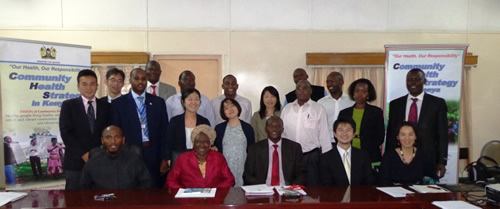- Home
- Technical Cooperation Projects
- Index of Countries
- Africa
- Kenya
- Project for Strengthening Community Health Strategy
- Project News
- CHS Project Terminal Evaluation Exercise
Project News
2014-07-15
CHS Project Terminal Evaluation Exercise
Our Project will come to an end in three months, very soon.
In order to implement effective and efficient project through Overseas Development Assistance (ODA) and achieve transparency and accountability, we had a terminal evaluation team to conduct the Ministry of Health (MoH) /JICA joint Terminal Evaluation from 28th April to 16th May 2014 for about three weeks.
The main purpose of the JICA's terminal evaluation is 1) to review the Project performance with focus on the results of Inputs and activities implemented, the level of achievement of Outputs, Project Purpose and Overall Goal, 2) to analyze promoting and/or inhibiting factors for the Project performance, 3) to evaluate the Project based on five evaluation criteria, "relevance", "effectiveness", "efficiency", "impact", and "sustainability", 4) to make recommendations to stakeholders of the Project, and derive lessons for similar project in the future.
Looking at all areas mentioned above, the Project was evaluated highly despite the short Project period of three years.
Some of the lessons were drawn as follows:
- When the project aims to develop guidelines, tools, standard or training materials, working under the nationally determined coordination and decision making mechanism (such as Inter-agency Coordinating Committee and Technical Working Group), ensures the products to be approved as national standard. Project progress and achievement are also well shared among the Ministry and development partners that maintained visibility and accountability of the Project.
- Involvement of national experts, champions/famous personalities as public relations ambassadors, and capacity development of media in tandem with support for production of media programme are effective ways for advocacy. The Project worked closely with CHS Goodwill Ambassador for CHS advocacy through TV programme, newspaper, radio, other IEC materials and attracted great attention from the public. It is common for projects to make press releases on big events, but the Project took a unique approach to continuously engage the media. This contributed to sustain the media's attention and interest for CHS.
- As for the type of project which targets national government, starting by the dispatch of Advisor before its start is efficient and promotes smooth implementation. Joint effort for CHS by MoH and JICA started by dispatch of Community Health Strategy Advisor who continued the support as the Chief Advisor of the Project, which speeded up the starting of project activities and smooth collaboration between the Project and the Ministry.
Some of the challenges were identified. After the devolution in July 2013, county governments play main roles in budgeting and implementing community health services. Thus, it requires more CHS advocacy to the county government for buy-in. The bureaucratic process of coordination between national and county governments is also of concern. Financial sustainability is still a challenge as implementation of CHS is heavily dependent on partners. Another emerging challenge was to manage research activities and produce the quality scientific results in 3 years while the Project focuses on building capacity of the MoH in research activities, which requires more time.
The Project already began addressing some of the issues mentioned so that sustainability of CHS could be ensured even after the Project is completed on 31st August 2014.
 JCC for the Terminal Evaluation
JCC for the Terminal Evaluation
- About JICA
- News & Features
- Countries & Regions
- Our Work
- Thematic Issues
- Types of Assistance
- Partnerships with Other Development Partners
- Climate Change / Environmental and Social Considerations
- Evaluations
- Compliance and Anti-corruption
- Science and Technology Cooperation on Global Issues
- Research
- JICA Development Studies Program / JICA Chair
- Support for the Acceptance of Foreign HRs / Multicultural and Inclusive Community
- Publications
- Investor Relations
